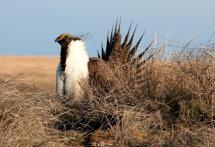ARCHIVED NEWS RELEASE
This document is provided for archival purposes only. Archived documents
do not reflect current WDFW regulations or policy and may contain factual
inaccuracies.
News release Oct. 1, 2020
Taylor Cotten (360) 902-2505; Jason Wettstein (360) 704-0258
OLYMPIA – Biologists at the Washington Department of Fish and Wildlife (WDFW) estimate that recent wildfires have burned tens of thousands of acres of Eastern Washington Sage-grouse habitat adding to the reasons that the department is recommending endangered status for Sage-grouse in Washington through its periodic status review processes.

Such reviews periodically assess the status of protected species and recommend status changes if warranted. The designation change from threatened to endangered would increase current levels of protection to promote the survival of Sage-grouse in the state.
Habitat loss is the single greatest threat to Greater Sage-grouse and is exacerbated by the immediate threat of wildfire. While WDFW staff may not know the full impacts to grouse populations until spring, they estimate that recent wildfires may reduce the number of threatened Greater Sage-grouse by 30- to 70 percent bringing the statewide population dangerously low.
“The fires have caused a devastating setback to recovery of Sage-grouse populations in eastern Washington,” said Mike Livingston, south central regional director with the agency. “Vast acreages of Shrub-steppe habitat just burned, and surviving birds are more vulnerable to predators and winter conditions,” he adds.
The draft periodic status review for Greater Sage-grouse is available for review at WDFW’s species status review webpage. The public can provide comments on the draft document for the next 90 days, the time period required by Washington Administrative Code, through December 30, 2020.
Written comments on the review and recommendation can be submitted via email to TandEpubliccom@dfw.wa.gov or by mail to Taylor Cotten, Washington Department of Fish and Wildlife, P.O. Box 43141, Olympia, WA 98504-3200.
WDFW is the state agency tasked with preserving, protecting and perpetuating fish, wildlife and ecosystems, while providing sustainable fishing, hunting and other outdoor recreation opportunities. The agency works to keep common species common and restore species of greatest conservation need.